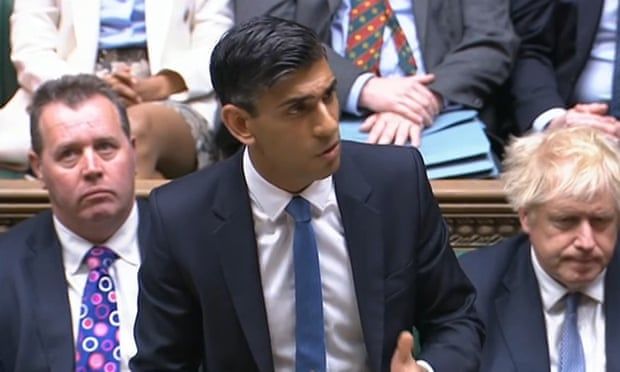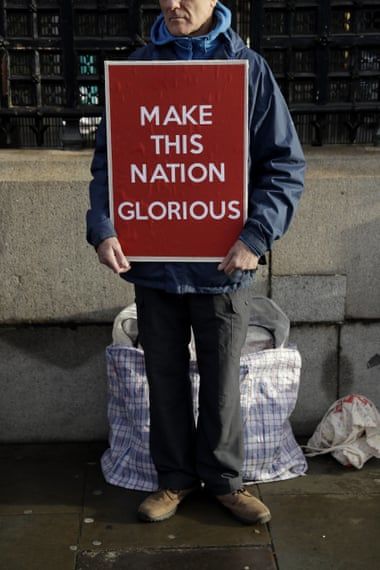
Tax rises, handouts, law-breaking: what do the Tories stand for now?
After yet another long and difficult week in the premiership of Boris Johnson, Conservative MPs returned to their constituencies on Thursday and Friday wondering what on earth they would say to voters back home.
“I just have to talk about what I have done for my area and try not to mention what is going on here [at Westminster],” said one former minister. “It is the only way I have any chance of winning next time.”
Wednesday had seen the senior civil servant Sue Gray publish her damning verdict on “Partygate”. Despite repeated denials from Johnson that any parties had taken place, Gray methodically laid out details of 16 events – several attended by the prime minister himself – with examples of excessive drinking, mistreatment of cleaning and other staff, and general Covid rule-breaking at the heart of power.
“The senior leadership at the centre, both political and official, must bear responsibility for this culture,” she said. The prime minister responded initially by telling MPs he was “humbled”, before defiantly rewriting the ministerial code so that ministers would not always be expected to resign for breaking rules. To the astonishment of many in his own party he also removed a section from the code about the importance of ethics in government.
After Gray, the government was, however, desperate to “move on” from Partygate and address “the people’s priorities” in order to stop the flow of negative news and court some desperately needed popularity.
The chancellor, Rishi Sunak, obliged on Thursday with a £15bn package of help for those struggling with the cost of living, to be paid for in part by a windfall tax on the spiralling profits of oil and gas firms.
It mattered not to Johnson that Labour had been proposing such a tax for five months and that he had repeatedly rejected it for being too anti-business, and essentially unTory. Conservative whips had ordered Tory MPs three times to vote against Labour’s proposal over recent weeks in the Commons.
 The chancellor Rishi Sunak making a statement
in the House of Commons on the cost of living crisis. He rivals Gordon
Brown in imposing tax rises.
The chancellor Rishi Sunak making a statement
in the House of Commons on the cost of living crisis. He rivals Gordon
Brown in imposing tax rises.
But as Sunak unveiled what he called the “temporary, targeted energy profits levy” – Labour’s plan renamed and repackaged – Johnson grinned across the dispatch box, seemingly delighted to have pulled off such a brazen theft of the opposition’s big idea for tackling the cost of living crisis.
These have been confusing and, for many, dispiriting times to be a Tory MP. Many confide privately that it is not just Johnson’s behaviour, the rule-breaking and misleading over parties that is difficult to defend and grinding them down. At the same time, they say, there is also a broader issue – a wider identity crisis – that his premiership has created.
The problem of the leader, they say, is one thing. The direction in which the party at large is heading ideologically under his stewardship, another. What does it stand for, what does it believe in?
Under Margaret Thatcher – certainly by the end of her premiership – the answer to those questions was abundantly clear. Conservatism meant rolling back the frontiers of the state, getting government off people’s backs and out of their lives as far as possible, lowering taxes and giving people a greater share of the money they earned. It was also about strong leadership and a respect for law and order.
Today, many Conservative MPs struggle to identify any of those as characteristics in the post-Covid administration of Boris Johnson. Rather Johnsonism, if it is anything, is defined by chaos, rule-breaking, U-turns and economic policies that are the reverse of Thatcherite. Rather than cut taxes to stimulate growth, as many Tory MPs would have wanted, Johnson’s team has raised them to heights not seen for decades.
The Institute for Fiscal Studies said last week that in little over a year Sunak had imposed tax rises similar in scale to those introduced over 10 years of Gordon Brown’s chancellorship, leaving the UK with the highest overall tax burden since the 1960s.
Asked after Sunak’s statement what the Tories’ biggest problem was, one minister said: “It is that we don’t have a clear strategy. It is that we are not clear what we are.”
Even the most ardent Thatcherites on the Tory backbenches recognise that in exceptional times such as the present, pragmatism has to trump ideology. They know that a cost of living crisis needs big interventions by the centre.
But the increasing worry on the right, and in the Tory-supporting media, is that the entire Conservative brand – the offering – is now fuzzy and unclear, as well as contaminated by what has gone on in No 10.
Anxiety about a lack of identity is spreading. On Wednesday, as rumours spread that Sunak would adopt Labour’s windfall tax plan, the Tory MP for Carlisle, John Stevenson, rose at prime minister’s questions, seeking reassurance. “Labour and socialism have failed the country because their failed policies interfere too much in people’s lives, over-regulate, spend too much taxpayers’ money, borrow too much and raise taxes. Will the prime minister tell the House what policies his government will follow to ensure that we do not have a similar fate?” Johnson replied by focusing narrowly on reductions to national insurance but dodged the thrust of the question.
 The windfall tax on energy companies has been denounced on the Tory right.
The windfall tax on energy companies has been denounced on the Tory right.
After Sunak’s announcement, Tory commentators despaired that the party seemed to have ditched its commitment to low taxation.
Fraser Nelson, editor of the Spectator, wrote in the Daily Telegraph on Friday: “After years banging on about the case for low taxation – the quaint idea that societies are fairer and stronger when people are allowed to keep more of the money they earn – the Tories have now given up.
“Handouts are preferred to general tax cuts, allowing the state to choose winners and losers. Ed Miliband’s old idea about good and bad companies (the ‘predators’) is now back. Taxation is spoken of in moral terms: a tool to service justice to stubborn companies making ‘excess’ profits.”
The Daily Mail described Sunak’s package as a “£21bn splurge” and asked “when will the Tories get back to just cutting taxes?”. In the Commons, the Conservative MP Richard Drax was one of several who questioned what was going on. Addressing Sunak, he said: “I warn my right honourable friend that throwing red meat to socialists, by raising taxes on businesses and telling them where to invest their money, is not the Conservative way of encouraging those who create our prosperity and jobs to do just that. Does he agree that, by setting this bar, we are in danger … of allowing the socialists to raise it, which they would do with relish again, again and again?”
The former Tory cabinet minister David Gauke said he felt for MPs who had to defend the prime minister and also make clear to voters what the current Conservative party stood for. “They have a broad coalition of voters to satisfy, a leader who does not have deep beliefs and an exceptional crisis. I completely see why Tory MPs are worried. All they have is cultural wedge issues like [sending asylum seekers to] Rwanda. But that does not amount to a strategy.”
As Gauke suggested, Johnson has a set of challenges that no Tory leader before him has had to address. One is the economic aftermath of the Covid pandemic, compounded by the effects of war in Ukraine.
But the other is the consequence of his own past success. By leading the Conservatives to an 80-seat majority at the 2019 general election, with promises to “get Brexit done”, and by exploiting fears of a Jeremy Corbyn government, Johnson broke through the red wall and inherited a complex and incoherent coalition of Tory voters with wildly differing priorities and needs.
 Boris Johnson ‘got Brexit done’ but in doing so, inherited a broad coalition of voters who are difficult to satisfy.
Boris Johnson ‘got Brexit done’ but in doing so, inherited a broad coalition of voters who are difficult to satisfy.
Robert Ford, professor of political science at Manchester University, says the difficulties of serving this coalition help explain some of the discontent: “The ‘red wall’ seats gained in 2019 are deprived places where state intervention is sorely needed and very popular. Local MPs, even if they personally favour low taxes and a small state (and not all of them do), respond to the context they face, and therefore favour the big state interventionism of ‘levelling up’.
“But the money for that has to come from somewhere, and as the government faces growing economic pressure, Conservative MPs from wealthier bits of the south of England increasingly worry that ‘levelling up’ ultimately means taking money from their voters and giving it to voters elsewhere.
“MPs who don’t like big spending on principle like it even less when it is their voters paying the bills but seeing little of the benefit. This, I suspect, is the root cause of some of the disquiet.”
What is beyond doubt is that many Tory MPs are now very worried indeed that, after 12 years in government, the period of Conservative rule could be nearing an end. Sir Bob Neill, one of those who has demanded a leadership contest, told the Observer on Saturday that the mix of leadership issues over parties and the absence of clear direction was potentially lethal for his party. “When you put the trust issue and the identity issue together, you do have a pretty toxic mix as far as voters are concerned.”
Already there is evidence of support slipping away. A YouGov MRP poll for the Times on Friday found that the Conservatives face virtual wipeout behind the red wall, and severe losses in the south of England, with Johnson himself set to lose his Uxbridge and South Ruislip seat along with the former leader Iain Duncan Smith in Chingford and Woodford Green.
The poll suggests the Tories would lose all but three of 88 battleground seats they hold by a slim margin over Labour. The former Tory cabinet minister David Davis said his colleagues could “see their own seats disappearing” as his party’s popularity plunged and Johnson hung on to power without a wider sense of purpose. On Saturday, the former health minister Steve Brine became the latest MP to send a letter to the chairman of the 1922 committee, Sir Graham Brady, expressing no confidence in Johnson’s leadership. “I have said throughout this sorry saga I cannot and will not defend the indefensible. Rule-makers cannot be law-breakers.”
In the very short term, Johnson looks safe. But the number demanding a leadership contest is climbing daily towards the figure of 54 needed to trigger a contest. So far, 23 have gone public but others have put in letters without announcing they have done so. Brady refuses to reveal the figures.
After the Gray report and Sunak’s announcement, on Wednesday and Thursday respectively, there was said to be a celebratory mood in No 10 because the PM’s team felt he had pulled through. “They think they have won. They are in full bulldozer mood,” said a senior party official who used to work there.
In the wider parliamentary party, however, such optimism is not widely shared as Conservative MPs ponder not only whether to get rid of their leader but also, increasingly, what their party stands for with him in charge.











